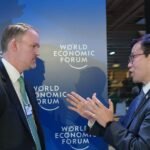
The National Pension Service (NPS) and Korea Investment Corp. (KIC) are actively exploring mid-market infrastructure opportunities as they are expected to yield stable returns regardless of economic conditions, offsetting volatility caused by US tariff policies.
The NPS, the world’s third-largest pension scheme, is also settings its eyes on secondary and credit deals in the infrastructure sector to accelerate capital deployment. To that end, it launched the Infrastructure Solutions team early this year.
“We have completed deployments to large-cap investments to some extent and will continue to re-up,” Lee Jaewook, head of infrastructure investment division at NPS, said in a panel discussion at the global investment conference ASK 2025 on Friday.
“We have been looking to mid-cap investment opportunities for the past three to four years to fill a gap in our portfolio,” he added.
Kim Wonbin, a senior director of KIC, echoed Lee’s words.
“We’re exploring opportunities to include mid-cap managers in the US and Europe (in our portfolio managers) for the past two to three years ago to fill a gap in our portfolio,” said Kim told the panel discussion of four Korean limited partners. “We expect to invest in quality assets and generate (strong) returns through mid-cap deals.”
Kim oversees infrastructure investments in the sovereign wealth fund.

BEYOND CORE STRATEGY
NPS’s Lee said the pension fund prioritizes prompt capital deployment to keep pace with its rapid asset growth. The South Korean pension scheme projects its assets to double to 3,500 trillion won ($2.6 trillion) by 2050.
“We’re looking to expand into value-add and non-core deals beyond core and core plus strategies to accelerate capital deployment,” he said at the panel session during the biannual investment forum hosted by The Korea Economic Daily.
By sector, the NPS is actively looking into digital infrastructure like data centers. By contrast, the KIC has become more selective in the sector, in which KIC’s Kim said it is overweight.
KIC has invested in infrastructure primarily through private equity. It expects the current valuation declines to create opportunities to snap up prime assts at more reasonable prices.
The sovereign weaelth fund targets returns above its benchmark: the G7 average consumer price index plus 4%.
By Yeonhee Kim
yhkim@hankyung.com
Jennifer Nicholson-Breen edited this article.















